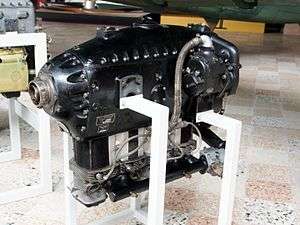Hirth HM 504
The Hirth HM 504 is a four-cylinder air-cooled inverted inline engine. The HM 504 was a popular engine for light aircraft of the 1930s-1940s, and it was used to power a number of Germany's trainer aircraft of World War II. The engine featured a cast magnesium alloy crankcase.[1] The Hitachi Hatsukaze Model 11 was a Japanese licensed version.
| Hirth HM 504 | |
|---|---|
 | |
| Hirth HM 504 on display at the Flugausstellung Hermeskeil | |
| Type | Inline piston engine |
| National origin | Germany |
| Manufacturer | Hirth-Motoren GmbH, Stuttgart-Zuffenhausen |
| Major applications | Bücker Bü 131 |
| Developed into | Hitachi Hatsukaze |
Applications
- Bücker Bü 131
- Bücker Bü 181
- BŻ-1 GIL (helicopter)
- Klemm Kl 35
- Matra-Cantinieau MC-101 (helicopter)
- Morane-Saulnier MS.603
- Payen Arbalète
- Repülőgépgyár Levente II
Specifications (HM 504 A-2)
Data from Flugzeug-Typenbuch. Handbuch der deutschen Luftfahrt- und Zubehör-Industrie 1944[2], Der Flugmotor. Bauteile und Baumuster[3]
General characteristics
- Type: 4-cylinder air-cooled inverted inline
- Bore: 105 mm (4.13 in)
- Stroke: 115 mm (4.53 in)
- Displacement: 3.980 l (242.87 cu in)
- Length: 945 mm (37.2 in)
- Width: 520 mm (20.5 in)
- Height: 780 mm (30.7 in)
- Dry weight: 107 kg (236 lb) dry, unequipped
- 124 kg (273 lb) wet, equipped
Components
- Valvetrain: 1 inlet and 1 exhaust under-valve per cylinder driven by pushrods and rockers
- Fuel type: 80 Octane
- Oil system: dry sump, pressure feed with scavenge
- Cooling system: air-cooled
Performance
- Power output:
- 105 PS (104 hp; 77 kW) at 2,530 rpm (5 minutes) at sea level
- 95 PS (94 hp; 70 kW) at 2,450 rpm (30 minutes) at sea level
- 85 PS (84 hp; 63 kW) at 2,360 rpm (max. continuous / cruise) at sea level
- Specific power: 26.35 PS/l (0.43 hp/cu in; 19.38 kW/l)
- Compression ratio: 6.2:1
- Specific fuel consumption: 0.228 kg/PS/h (0.510 lb/hp/h; 0.310 kg/kW/h) at max continuous
- Oil consumption: 0.002–0.003 kg/PS/h (0.004–0.007 lb/hp/h; 0.003–0.004 kg/kW/h) at max continuous
- Power-to-weight ratio: 0.98 PS/kg (0.44 hp/lb; 0.72 kW/kg)
- B.M.E.P.: 9.37 atm (9.49 bar; 137.7 psi)
gollark: Mine is a 3Bnotplus running about one application right now.
gollark: I moved primarily because Minecraft has zero optimization.
gollark: They're great, very cheap and can probably even run on solar power reliably.
gollark: My webserver used to run on one of those.
gollark: ^
See also
Related development
Comparable engines
- Alfa Romeo 110
- Argus As 8
- Blackburn Cirrus Minor
- de Havilland Gipsy Minor
- Elizalde Tigre IV
- Menasco Pirate
Related lists
References
| Wikimedia Commons has media related to Hirth HM 504. |
- Gunston, Bill (1989). World Encyclopaedia of Aero Engines (2nd ed.). Cambridge, England: Patrick Stephens Limited. p. 77. ISBN 978-1-85260-163-8.
- Schneider, Helmut (Dipl.Ing.) (1944). Flugzeug-Typenbuch. Handbuch der deutschen Luftfahrt- und Zubehör-Industrie 1944 (in German) (Facsimile reprint 1986 ed.). Leipzig: Herm. Beyer Verlag. p. 396. ISBN 381120484X.
- Katz, Hans (Dr.Ing) (1940). Der Flugmotor. Bauteile und Baumuster. Luftfahrt Lehrbücherei Band 7. Berlin: de Gruyter.
This article is issued from Wikipedia. The text is licensed under Creative Commons - Attribution - Sharealike. Additional terms may apply for the media files.